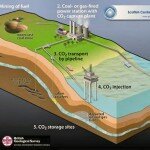Posted in Comment on 12/01/2009 04:20 pm by Stephen Tindale
It will be cheaper to control climate change than not to control it, as the Stern Review memorably said. However, that does not mean that it will be cheap.
read more »
Posted in Comment on 03/16/2010 02:25 pm by Stephen Tindale
This month, the US Department of Energy has announced a Sustainable Energy Resources for Consumers (SERC) programme. This will offer grants totalling up to $109 million.
read more »
Posted in Comment on 12/17/2010 02:08 pm by Stephen Tindale
UK Energy Secretary, Chris Huhne, has proposed a radical overhaul of the UK’s electricity market. This is good news, but the government must do more to combat fuel poverty.
read more »
Posted in Comment on 07/17/2009 07:33 pm by Stephen Tindale
On Wednesday 15 July 2009, the UK government published its plan to make the UK a low carbon economy. It is good on electricity, quite good on energy efficiency and heat, but bad on transport.
read more »
- Tags: carbon capture, carbon tax, CCS, CHP, climate change levy, coal power, decarbonisation, energy efficiency, fuel poverty, nuclear power, renewables, statistics, wind power
Posted in Comment on 04/18/2010 03:04 pm by Stephen Tindale
The manifestos of the three main UK political parties, Conservative, Labour and Liberal Democrat, all agree that climate change is an extremely serious issue and that tackling it can be done in ways which enhance energy security and strengthen the UK economy.
read more »
Posted in Comment on 06/10/2016 07:28 am by Stephen Tindale
In less than two weeks’ time, the UK will vote on whether to stay in or leave the EU. I am doing all I can for the Stronger In campaign (http://www.strongerin.co.uk/#QkGoYymoqlkpWtIE.97). Opinion polls predict a very close result. Being Labour, I never believe opinion polls. Britain could well vote to leave. But I’m also an […]
read more »
Posted in Comment on 08/21/2014 04:49 pm by Stephen Tindale
My response to a speech by Shadow Energy and Climate Change Caroline Flint, published by Progress Online
read more »
Posted in Comment on 06/23/2009 08:46 am by Stephen Tindale
Burning coal is an extremely damaging way to generate electricity. Coal has a very high carbon content, so is a major source of greenhouse gasses. Burning it also results in pollutants that are directly damaging to human health, such as sulphur dioxide.
read more »
Posted in Comment on 06/25/2009 12:54 pm by Stephen Tindale
On 24 June 2009, the UK government announced that the UK aims to have installed 33Gw of offshore wind by 2020, generating a quarter of the UK electricity needs. But it won’t be cheap.
read more »
Posted in Comment on 04/26/2010 03:48 pm by Stephen Tindale
This morning I attended an event called ‘Ask a Climate Question’ organised by a coalition of environment and development groups. The most striking aspect of the discussion was that, with the exception of nuclear power, there was broad consensus among the four parties.
read more »
Posted in Comment on 06/26/2014 06:33 am by Stephen Tindale
You can read here my Sunday Express article on David Cameron’s attempt to stop Jean-Claude Juncker becoming President of the European Commission.
read more »
Posted in Comment, Policy on 05/31/2016 08:45 am by Stephen Tindale
Vote Leave is today claiming that, if the UK leaves the EU, domestic energy bills would be lower. They are wrong. Domestic energy bills could and should be reduced by changing taxes and tariffs. It is possible to do this without leaving the EU. Quitting the European Internal Energy Market – the single market for […]
read more »
Posted in Comment on 10/04/2010 10:25 am by Stephen Tindale
Last week, I attended a European Commission conference on the future of energy policy. Energy Commissioner Oettinger delivered a worthy though unsurprising speech, but did at least stress energy efficiency – “vast untapped potential” – and said that this was his first priority.
read more »
Posted in Comment on 03/05/2010 03:03 pm by Stephen Tindale
On Wednesday and Thursday, I attended a conference on renewable energy in Scotland, on the stunningly beautiful island Skye. I talked about how to dispel myths about climate change and renewables.
read more »
Posted in Comment on 05/05/2010 02:21 pm by Stephen Tindale
This week, I attended a conference in Brussels organised by the King Baudouin Foundation. It was about how to control climate change while also increasing social justice. Therefore, the issue of making existing homes more energy efficient was central to the discussion.
read more »
Posted in Comment on 01/07/2010 11:00 am by Stephen Tindale
Scotland has immense potential to expand renewables, particularly wind and the Scottish National Party (SNP), when it took over the Scottish government in 2007, set a target that half of all Scotland’s electricity should come from renewables by 2020.
read more »
Posted in Comment on 10/08/2009 10:43 am by Stephen Tindale
The US budget deficit has more than tripled to a record $1.4trn (£877bn, €948bn) in the year to 30 September 2009, due to increased government spending and a big drop in tax revenues. So, how is the US going to pay for a transition to a low-carbon economy?
read more »
Posted in Technology on 06/23/2009 08:26 am by Stephen Tindale

Coal has a very high carbon content, so is a major source of greenhouse gasses and the economic costs of polluting the atmosphere are not borne by the polluter, In economic jargon, ‘the externalities are not internalised’.
read more »
Posted in Behaviour on 11/04/2015 10:34 am by Suzanna Hinson
Four key things that individuals can do to improve energy efficiency at home
read more »
Posted in Behaviour, Policy on 11/29/2009 06:23 pm by

Over six million households in the UK currently need to spend more than 10% of their income on keeping warm – a figure that many predict to increase with the likely rise in fuel price over the next few years.
read more »
Posted in Policy on 04/17/2010 05:44 pm by Stephen Tindale

All three main UK parties take climate seriously and promise to reduce emissions and expand low-carbon energy. They all recognise the energy security and employment benefits. This article includes direct quotations from the relevant parts of the manifestos of the three main parties on general climate policies, covering investment, taxation, land-use planning, adaptation, the EU, the developing world and forests.
read more »
Posted in Policy on 04/17/2010 05:53 pm by Stephen Tindale

All three main UK parties take climate seriously and promise to reduce emissions and expand low-carbon energy. They all recognise the energy security and employment benefits. This article includes quotations from the relevant parts of the manifestos of the three main parties on heat and electricity – energy efficiency, fuel poverty and energy production.
read more »






